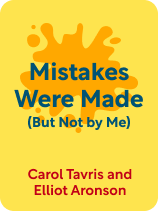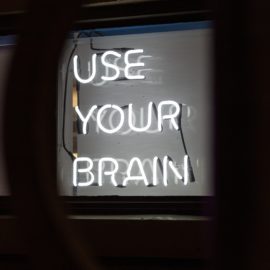

This article is an excerpt from the Shortform book guide to "Mistakes Were Made (But Not by Me)" by Carol Tavris and Elliot Aronson. Shortform has the world's best summaries and analyses of books you should be reading.
Like this article? Sign up for a free trial here.
What are some examples of self-justification? Why do we want to protect ourselves from cognitive dissonance?
Rather than admitting wrongdoing or accepting contradictory beliefs, most people find ways to justify their actions to themselves and others. According to Carol Tavris and Elliot Aronson in their book Mistakes Were Made (But Not by Me), this process is called self-justification.
Keep reading to look at self-justification examples to better understand the psychology behind it.
Protecting Our Sense of Self
We’ll discuss three self-justification examples we all do that justify bad decisions. We tell ourselves: 1) that we’re rational; 2) that we’re competent; and 3) that we’re righteous.
Belief #1: I Am a Rational Person
The first self-justification example is when we try to convince ourselves that our decisions are rational. We’re naturally inclined to believe that we’re rational actors moving through an ordered existence. The authors note that to avoid dissonance, we refuse to acknowledge any information that suggests we’ve made a decision based on something other than rationality. Self-justification helps us convince ourselves that our irrational decisions and beliefs are actually well-founded.
Shortform note: The idea that humans are uniquely rational creatures has endured in Western philosophy and psychology since the ancient Greek philosopher Aristotle posited that the ability to reason sets humans apart from other animals. However, some modern schools of philosophy hold the opposite true—they argue that humans are the only irrational animals. Other animals act without hesitation and in perfect alignment with their basic needs, while humans are constantly hindered by emotions such as doubt and fear, causing us to act against our own best interests. Therefore, the fundamental, dissonance-provoking belief that we always act rationally would be inherently false.)
Belief #2: I Am a Competent Person
Another commonly held self-perception we’re compelled to defend is our sense of competence. Tavris and Aronson state that most of us believe we’re of above-average competence and intelligence, and this belief contributes to our positive sense of self.
Therefore, when we make mistakes or learn that we’ve made decisions based on incorrect beliefs, we feel foolish and embarrassed. We believe that a competent person wouldn’t make such an error, so we seek to preserve our positive self-image by resolving the dissonance between our mistaken actions and the resulting consequences.
We often resolve our dissonance by passing the blame for the mistake to someone else or by wholly denying we made a mistake. The more serious the mistake was, the greater the dissonance will be, and the more motivation we have to absolve ourselves of wrongdoing.
Consider our earlier example, where you make a mistake at work. If your mistake only costs your company a small amount of money, you’ll likely fix the issue by admitting your blunder. You can acknowledge it and attribute it to human error without it affecting your sense of competence too much. However, if your mistake costs the company a large sum of money and leads to bigger personal consequences, you’re more likely to downplay your mistake, make excuses, or blame someone else to resolve the dissonance, since it poses a substantial threat to your sense of competence.
Belief #3: I Am a Good Person
The final and often most powerful quality that contributes to our positive self-image—and that we thus aim to keep free from dissonance—is our belief that we’re good and righteous individuals. According to Tavris and Aronson, we all want to believe we’re good people, so we’re highly motivated to justify any actions we take that threaten our sense of righteousness. This is especially true in circumstances where we hurt other people—we have to reconcile the harm we’ve caused with our belief in our own goodness.

———End of Preview———
Like what you just read? Read the rest of the world's best book summary and analysis of Carol Tavris and Elliot Aronson's "Mistakes Were Made (But Not by Me)" at Shortform.
Here's what you'll find in our full Mistakes Were Made (But Not by Me) summary:
- Why we feel discomfort when we act in a way that doesn't align with our values
- How patterns of self-justification can cause our beliefs to diverge sharply from other people’s
- How we can break the cycle of self-justification and hold ourselves accountable






